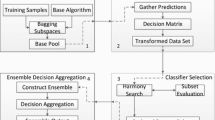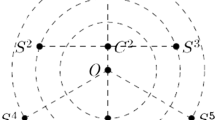Abstract
The classifier ensembles have been used successfully in many applications. Their superiority over single classifiers depends on the diversity of the classifiers forming the ensemble. Till now, most of the ensemble diversity measures were derived basing on the binary classification information. In this paper we propose a new group of methods, which use the margins of individual classifiers from the ensemble. These methods process the margins with a bipolar sigmoid function, as the most important information is contained in margins of low magnitude. The proposed diversity measures are evaluated for three types of ensembles of linear classifiers. The tests show that these measures are better at predicting recognition accuracy than established diversity measures, such as Q or disagreement measures, or entropy.
Access this chapter
Tax calculation will be finalised at checkout
Purchases are for personal use only
Preview
Unable to display preview. Download preview PDF.
Similar content being viewed by others
References
Freund Y, Schapire R (1997) A decision-theoretic generalization of on-line learning and an application to boosting. Journal of Computer and System Sciences 55:119–139
Breiman L (1996) Bagging predictors. Machine Learning 24:123–140
Ho TK (1995) Random decision forests. In: Proc. of the 3rd Int’l Conference on Document Analysis and Recognition:278–282
Bryll R, Gutierrez-Osuna R, Quek F (2003) Attribute bagging: improving accuracy of classifier ensembles by using random feature subsets. Pattern Recognition 36:1291–1302
Schapire RE, Freund Y, Bartlett P, Lee WS (1997) Boosting the margin: a new explanation for the effectiveness of voting methods. In: Proc. 14th International Conference on Machine Learning:322–330, Morgan Kaufmann
Cortes C, Vapnik V (1995) Support-vector networks. Machine Learning 20:273–297
Brown G, Wyatt J, Harris R, Yao X (2005) Diversity creation methods: A survey and categorisation. Information Fusion Journal 6:5–20
Kuncheva L (2003) That elusive diversity in classifier ensembles. In: Proc. First Iberian Conference on Pattern Recognition and Image Analysis:1126–1138
Kuncheva LI, Whitaker CJ (2003) Measures of diversity in classifier ensembles and their relationship with the ensemble accuracy. Mach. Learn. 51:181–207
Arodz T (2005) Boosting the Fisher Linear Discriminant with random feature subsets. To appear in: IV International Conference on Computer Recognition Systems, CORES 2005, Advances in Soft Computing, Springer
Author information
Authors and Affiliations
Editor information
Editors and Affiliations
Rights and permissions
Copyright information
© 2005 Springer-Verlag Berlin Heidelberg
About this paper
Cite this paper
Arodź, T. (2005). Margin-based Diversity Measures for Ensemble Classifiers. In: Kurzyński, M., Puchała, E., Woźniak, M., żołnierek, A. (eds) Computer Recognition Systems. Advances in Soft Computing, vol 30. Springer, Berlin, Heidelberg. https://doi.org/10.1007/3-540-32390-2_6
Download citation
DOI: https://doi.org/10.1007/3-540-32390-2_6
Publisher Name: Springer, Berlin, Heidelberg
Print ISBN: 978-3-540-25054-8
Online ISBN: 978-3-540-32390-7
eBook Packages: EngineeringEngineering (R0)




